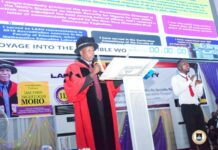A Coursera’s 2025 Global Skills Report, has rated South Africa as the most artificial intelligence (AI)-advanced country in Africa and 61st in the world.
Tunisia, Kenya and Morocco are in positions 68, 78 and 80, respectively.
Other African countries making it to the top 100 globally include Ghana, Rwanda, Botswana, Egypt, Zambia, Algeria, Côte d’Ivoire, Uganda and Cameroon.
The report covers data collected from 109 countries, representing 56% of the world’s recognised sovereign states.
However, like the rest of Africa, Nigeria registered an “exceptionally high share of learners studying on mobile devices” – at 73%, the highest among the 109 spotlighted countries.
A new feature in the report is the AI Maturity Index, a comparative analysis of global readiness that assesses progress in AI learning, research and innovation.
The micro-credentials education company ranked South Africa, Tunisia, Kenya and Morocco as ‘emerging’ in AI-readiness and the rest of the continent, alongside numerous countries in Asia and Latin America, as ‘lagging’.
Foster talent, stimulate growth
Botswana leads in Africa regarding global skill proficiency rankings across business, technology, and data science for the 109 countries highlighted.
The finding is based on learners’ performance on Coursera and key economic indices. Botswana ranked 56th, followed by Rwanda in 60th position and Morocco, Kenya, and South Africa in positions 71, 76 and 81, respectively.
According to the report, Sub-Saharan Africa is quickly advancing its digital skills ecosystem, boasting about eight million Coursera learners – a 20% year-over-year growth and the fastest globally. By expanding access to micro-credentials, Sub-Saharan Africa can foster job-ready talent, stimulate inclusive economic growth, and build a “globally competitive digital workforce”.
It notes that, in a region where women learners form 30%-35% of enrolment, ambitious national upskilling initiatives continue to coexist with cultural and resource constraints.
“Countries such as Botswana, with 50% women learners, however, demonstrate promising gender parity in digital skills development.” Globally, 46% of Coursera learners are women.
Across the region, a quarter of the women enrolled were taking courses in generative AI (GenAI), 18% were studying towards professional certification, and 28% were enrolled in STEM (science, technology, engineering and mathematics) courses.
Mobile phones enable digital transformation
Mobile phone-based learning adoption is high in the region, at 65%, extending educational reach across diverse populations. The report commends this enabling “considerable strides toward inclusive digital transformation”.
South Africa, where 93% of organisations actively run AI programmes, uses “extensive” mobile connectivity and advanced network infrastructure to enhance digital capabilities.
South Africa is advancing toward AI-readiness, with 93% of organisations implementing AI programmes, much higher than the global average of 88%.
Employer demand for AI and machine learning skills jumped 212% year-on-year, as mirrored by Coursera’s GenAI course enrolment demand, which grew by 157%.
On the other hand, professional certificate enrolments rose considerably by 31% during the period, indicating a rising demand for job-ready credentials and “opportunities to expand formal credential pathways”.
“Notably, 61% of Coursera learners are studying via mobile – among the highest globally – enabled by South Africa’s extensive mobile infrastructure, totalling over 140 million smartphone connections,” according to the report.
“As the region’s leader in 4G and 5G networks, South Africa is ready to drive digital and Internet of Things innovation.
By broadening credential-based training and capitalising on its high mobile connectivity, the country can greatly enhance digital skills, address critical workforce gaps, and sustain economic competitiveness.”














